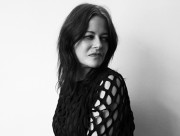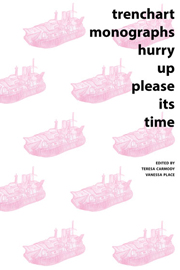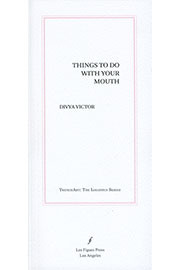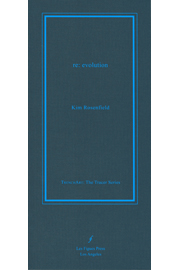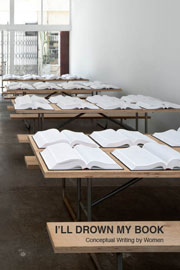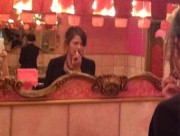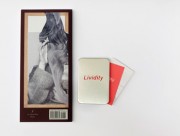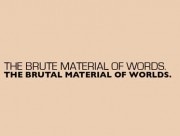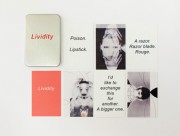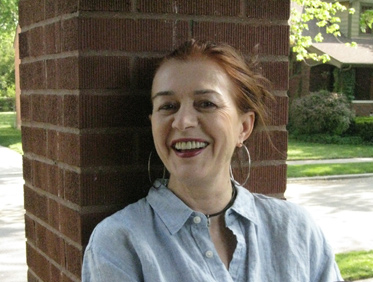Lividity
Kim Rosenfield
Introduction by Trisha Low
Cover art by Klaus Killisch
Book 2 of 5, TrenchArt Surplus Series
Poetry | $15.00
ISBN 13: 978-1-934254-37-0
Size: 9.25 X 4.25
Pages: 171
Binding: Softcover, Perfect
BUY NOW at LARB BOOKS
In Lividity, poet Kim Rosenfield works within the outskirts of language, draining it of connotation and excess. Using words and phrases culled from linguistics textbooks and language-learning manuals, Rosenfield invites the reader to experience everyday vernacular as dislocated affect. What happens when language acts as organ donor? When language, the conveyor of our vulnerability, is transposed into new and often failing terrain? Are expressions of meaning vital enough to keep the organism functioning? What happens when meaning loses its moorings?
Lividity compels the reader to navigate through language that sinks, coagulates, empties out, and becomes a forensic tool to determine linguistic/poetic cues of movement within or towards a concept of meaning making. Rosenfield’s poetry unsettles and disorients, but ultimately examines. It is an analysis, a scientific picking apart of communication and the limits of self expression.
Lividity is mind and body enmeshed in its own traces.
Lividity is published as part of the TrenchArt: Surplus Series, with an introduction by Trisha Low and visual art by Klaus Killisch. It is Kim Rosenfield’s second book to be published by Les Figues, along with re: evolution.
Praise for Lividity
“Language in Lividity pools in interstitial spaces of not-not-myself. Faced with the extreme everyday, with already-emitted notes we yet melancholically cling to, Rosenfield ignites the awareness that we can never be seamlessly located in our own shell casings, fleshy or otherwise. If, as Robert Creeley so famously asserted, “speech is a mouth,” here its lips are boiled red.”
— from the introduction by Trisha Low
“With Lividity, Kim Rosenfield taps glacial glossa to palatial palate, as ‘this endpoint of language comes very close to touching the hard palace.’ Penetratingly wry, sensual, and self-reflexive, it entrains the mind with a sculpted spatiality that re-construes and hallucinates all manners of articulation and interlocution. ‘They have made it with a richness and expression that we must pay homage to like we pay homage to the indispensible devotion attached to our laboratory of creation…’
One other thing. I think it rips through your clothes when it takes you over. Windows found some shredded long johns, but the name tag was missing. They could be anybody’s. Nobody…”
— Lanny Jordan Jackson
In the Victorian fashion of a high school second language class, anyone who reads Lividity is interpellated by its disciplining clarity—one becomes complicit in its reformative action upon one’s own subjectivity. In reading Rosenfield’s poem, like an act of recital, one puts one’s own brain and mouth through a re-performance of the lesson—as a repressive self-disciplining intended to level out language into some kind of proper English in the (dis)guise of colloquial conversation. The relations between poet, book, and reader become a network of simultaneous and unequal colonizations.
— Nick Thurston at BOMBLOG
A review by Patrick James Dunagan at NewPages
A review by Volta Blog
More Praise for Kim Rosenfield’s Work
On Good Morning—Midnight—:
“New York poet Kim Rosenfield finds the pivot where body image, conspicuous consumption, self-esteem, and ‘dome parties at Vassar’ form a crushing day-for-night in Good Morning—Midnight—. With withering linguistic looks and razor-sharp wit, Rosenfield deconstructs the sets of beliefs that hold media-created women together.”
— Publishers Weekly, 2002
On re: evolution:
“[…] Viewing the instability of language as an aesthetic opportunity, Rosenfield fuses appropriated texts from different genres (including evolutionary theory, psychoanalysis, and feminist theory)to create a radically disorienting textual topography.”
–Bookforum

